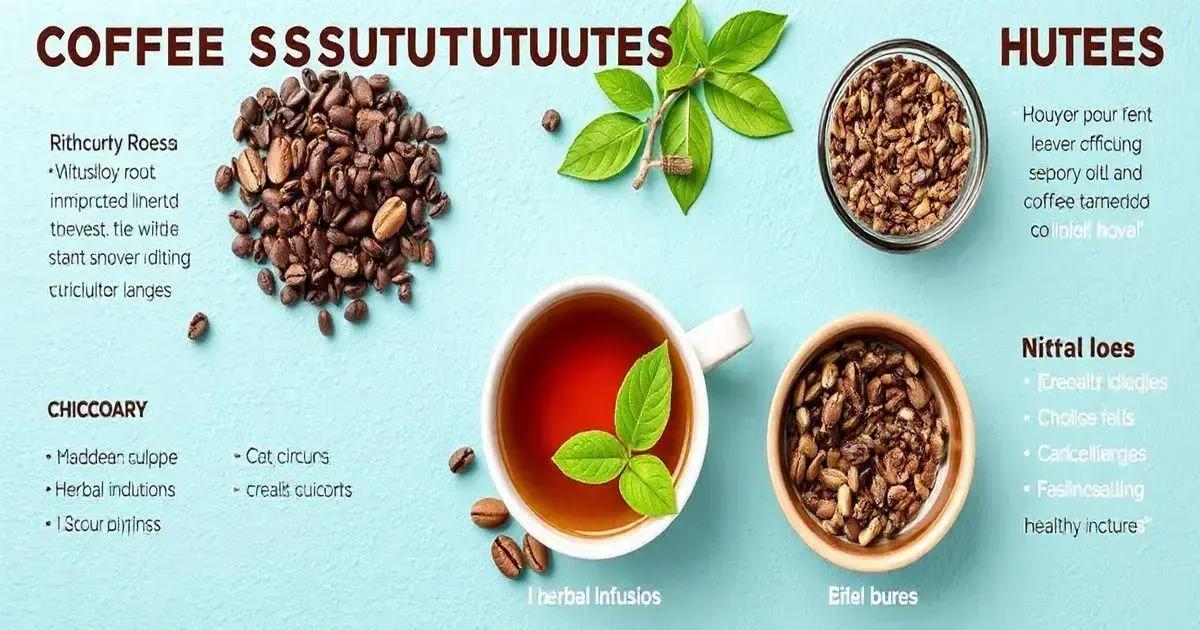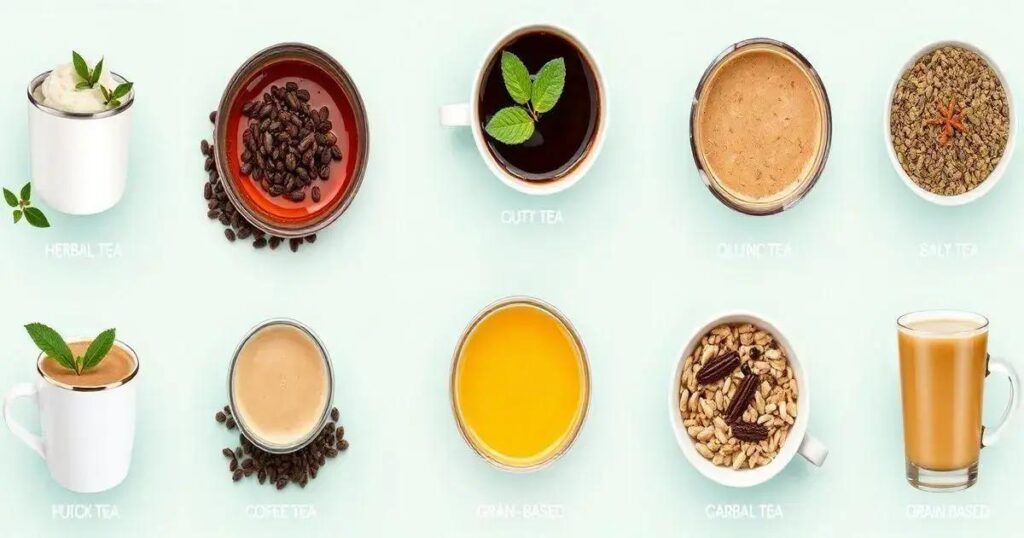Sustainable coffee alternatives are gaining popularity in men’s diets as they offer health benefits, environmental sustainability, and exciting flavor options. Popular choices include herbal teas and chicory coffee, which are lower in calories and caffeine. Transitioning to these alternatives can be done gradually, allowing individuals to explore a variety of tastes while enjoying a healthier lifestyle.
How sustainable coffee alternatives are gaining popularity in men’s diets is a significant trend. As health consciousness rises, men are exploring various options that align with their values and well-being. With environmental sustainability at the forefront, coffee substitutes are not just a health choice but a lifestyle statement. In this article, we will delve into the reasons behind this shift, the nutritional advantages these alternatives offer, and practical tips for making the switch successfully.
The Rise of Sustainable Coffee Alternatives

The rise of sustainable coffee alternatives is a remarkable trend that reflects a growing awareness of health and environmental issues among consumers. Many men are now seeking options that provide not only flavor but also nutritional benefits. These alternatives often include ingredients that are organic, caffeine-free, and rich in vitamins and minerals.
Popular Alternatives
Some of the most popular sustainable coffee alternatives include chicory root, which has a taste similar to coffee, and can be brewed into a rich, flavorful drink. Herbal teas and grain-based beverages like roasted barley or rye are also gaining traction. These options are often more environmentally friendly, requiring less water and fewer pesticides to produce compared to traditional coffee.
Environmental Impact
The environmental benefits play a significant role in the popularity of these alternatives. Sustainably sourced coffee can also be a part of this conversation, as consumers increasingly prefer brands that implement ethical farming practices. This dual focus on sustainability is appealing to men looking to enjoy their drink while minimizing their ecological footprint.
Health Conscious Choices
Health concerns are at the forefront for many men. Caffeine-related issues, such as anxiety or sleep disturbances, lead them to explore alternatives that deliver energy without the jitters. The nutritious profiles of these substitutes often include antioxidants and other beneficial compounds, making them excellent choices for those mindful of their health.
As a result, the rise of sustainable coffee alternatives is intertwined with not only personal health trends but also a broader commitment to environmental responsibility.
Nutritional Benefits of Coffee Substitutes

Nutritional benefits of coffee substitutes are becoming clearer as more people explore these alternatives. These substitutes are often lower in calories and can be rich in vitamins and minerals. For example, drinks made from roasted barley are packed with fiber, which aids digestion.
Rich in Antioxidants
Many coffee substitutes are high in antioxidants, which help fight free radicals in the body. For instance, chicory root is known for its antioxidant properties, which can contribute to better overall health.
Natural Energy Boost
Unlike regular coffee, which has caffeine, some coffee alternatives provide a more stable energy boost. Drinks like matcha or herbal infusions can enhance focus without the jitters, making them ideal for those who seek sustained alertness.
Support for Keto and Paleo Diets
Several coffee substitutes fit well into Keto and Paleo diets. For example, drinks made from almond milk or cacao are high in nutrients and low in carbs. This makes them preferred options for followers of these dietary trends.
By incorporating sustainable coffee alternatives, individuals can enjoy flavorful beverages while reaping various health benefits.
Men’s Shifting Preferences in Diets

Men’s shifting preferences in diets are driving a notable transformation in the food industry. Many men are becoming more conscious about their health and the environmental impact of their food choices. As a result, plant-based diets and natural ingredients are gaining traction.
Focus on Health
Health is a primary concern for many men today. This leads to a preference for cleaner, whole foods that promote well-being. For example, high-protein snacks like nuts or legumes are replacing traditional, less healthy options.
Environmental Awareness
Many men are also considering the environmental impact of their dietary choices. They aim to reduce their carbon footprint by opting for locally sourced and sustainable foods. This shift is evident in the rise of coffee substitutes made from sustainable ingredients, which align with the value of eco-friendliness.
Seeking Variety
Furthermore, there is a growing desire for variety and flavor in men’s diets. This exploration leads to trying new ingredients and cuisines that offer exciting flavors. Cultural food trends, like Asian-inspired dishes or Mediterranean diets, are becoming popular.
As more men adopt these healthy eating habits, sustainable coffee alternatives fit perfectly into their evolving dietary preferences.
Tips for Transitioning to Coffee Alternatives

Transitioning to coffee alternatives can be easier than you think. Here are some effective tips to make the switch smoother. First, start slowly. Gradually replace one cup of coffee a day with a coffee substitute. This way, your body will adjust without feeling deprived.
Explore Different Options
Many coffee alternatives are available, including herbal teas, roasted barley, and chicory coffee. Experiment with different flavors and brands to find what you enjoy most. Each has unique taste profiles, so take your time to discover your favorites.
Customize Your Brew
Many alternatives can be customized. You can add milk, sweeteners, or spices like cinnamon to enhance flavors. Creating your own blends may lead to a pleasant experience that mimics your usual coffee.
Stay Hydrated
It’s essential to stay hydrated while transitioning. Drinking plenty of water can help minimize withdrawal symptoms associated with quitting coffee. Consider keeping a water bottle nearby for easy access.
Finally, remember that everyone’s journey is unique. Give yourself time to adapt and enjoy exploring these rich and sustainable coffee alternatives.
Embracing Sustainable Coffee Alternatives
As the popularity of sustainable coffee alternatives rises, more men are embracing these choices for their health and the environment. These alternatives not only offer diverse flavors and nutritional benefits but also align with modern dietary preferences that focus on sustainability.
The transition to coffee substitutes can be simple with gradual changes, a variety of options, and personalized preparation. By exploring these alternatives, individuals can enjoy delicious beverages while making a positive impact on their health and the planet.
This shift reflects a broader trend toward mindful eating and living, where each cup can contribute to a more sustainable future.
FAQ – Frequently Asked Questions About Sustainable Coffee Alternatives
What are sustainable coffee alternatives?
Sustainable coffee alternatives are beverages made from ingredients that are environmentally friendly and often healthier, such as herbal teas, chicory root, and grain-based drinks.
Why are more men opting for coffee substitutes?
Men are increasingly aware of health and environmental issues, leading to a preference for beverages that are lower in caffeine and calories and promote better well-being.
How can I transition from coffee to alternatives?
Start by replacing one cup of coffee a day with a coffee substitute, explore different options, and customize your brews to find enjoyable flavors.
What nutritional benefits do coffee substitutes offer?
Many coffee substitutes are rich in antioxidants, lower in calories, and can provide sustained energy without the jitters commonly associated with caffeine.
Are coffee substitutes more environmentally friendly?
Yes, many coffee alternatives use sustainably sourced ingredients and require less water and resources compared to traditional coffee farming.
Can I still enjoy my morning routine with coffee alternatives?
Absolutely! You can create new morning rituals by brewing coffee substitutes, and many alternatives can be prepared in similar ways to traditional coffee.













